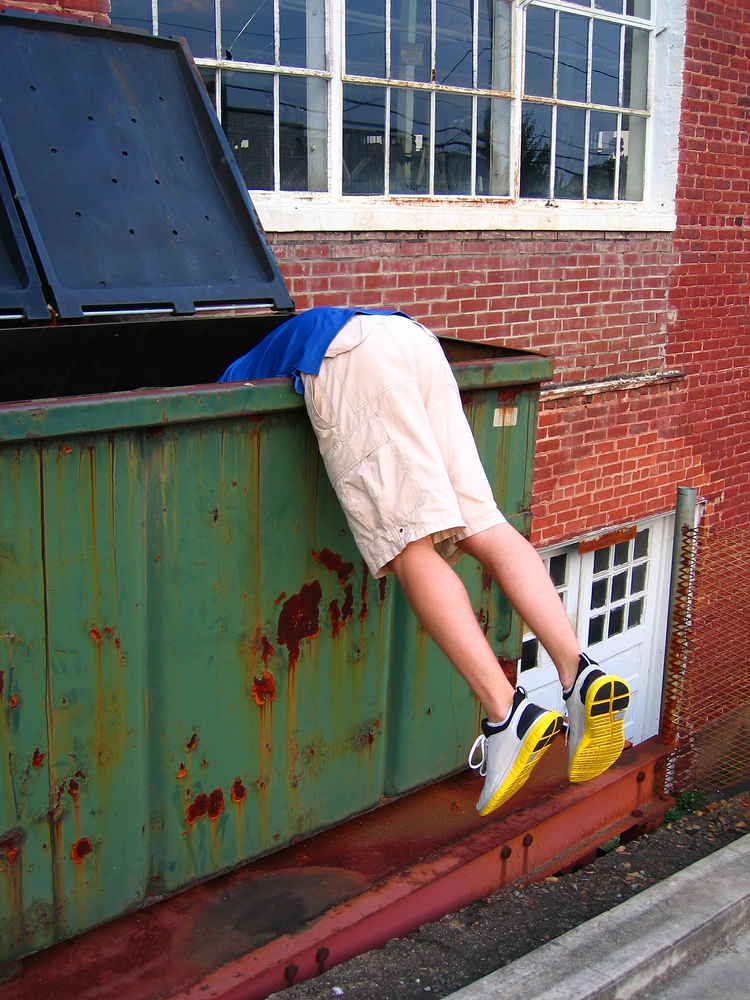Should retail businesses and restaurants be scared to donate food?
 With the holidays around the corner, I find myself thinking about some of my friends from college…specifically about a certain talent they possessed. Suffice it to say, if “Dumpster Diving” was an Olympic sport, they would’ve handily won the gold. They maintained a mental database of the best business dumpsters in town – who threw out bags of bagels and pastries baked that day, which markets tossed too-close-to-the-expiration-date groceries, and where to find slightly wilted, yet totally edible produce and boxed-up, untouched pizzas. While this type of “freegan” diet is still providing college students all over the country with a tasty, cost-effective break from their ramen, there are people in far greater need of that food.
With the holidays around the corner, I find myself thinking about some of my friends from college…specifically about a certain talent they possessed. Suffice it to say, if “Dumpster Diving” was an Olympic sport, they would’ve handily won the gold. They maintained a mental database of the best business dumpsters in town – who threw out bags of bagels and pastries baked that day, which markets tossed too-close-to-the-expiration-date groceries, and where to find slightly wilted, yet totally edible produce and boxed-up, untouched pizzas. While this type of “freegan” diet is still providing college students all over the country with a tasty, cost-effective break from their ramen, there are people in far greater need of that food.
Today, more than 48 million people in the U.S. are living with food insecurity; yet approximately 129 billion pounds of food are being thrown out by retailers and restaurants every year. Not all the food that is thrown away is suitable for consumption, of course, but there is some that is perfectly edible (like my friends’ treasure troves mentioned above). During this season of giving and helping those in need, these staggering figures – which seem to be in direct contrast with one another – beg the question: While great efforts are being made in the food industry to minimize waste, why don’t more businesses donate food they can no longer sell? Turns out, one of the top reasons is fear.
 In a recent interview with Grist.org, Steve Dietz from the Food Donation Connection says “the most common reason kitchens don’t donate is because management is afraid of the risk involved.” What type of risk, you ask? Well, thanks to our overly-litigious society, it is the risk of being sued if someone gets sick from spoiled donated food. According to a 2014 analysis by the Food Waste Reduction Alliance, 54% of food retailers and wholesalers and 67% of restaurants consider “liability concerns” as the greatest barrier to donating food. This perceived barrier has a substantial impact on the amount of food waste in the U.S., since retailers/wholesalers and restaurants throw away 57.6% and 84.3% of their food respectively. Turns out, this perception also impacts a business’s bottom line, since wasted food equals wasted money. So, before businesses toss their hard-earned profits into a landfill, it’s important to know whether this fear of liability is substantiated.
In a recent interview with Grist.org, Steve Dietz from the Food Donation Connection says “the most common reason kitchens don’t donate is because management is afraid of the risk involved.” What type of risk, you ask? Well, thanks to our overly-litigious society, it is the risk of being sued if someone gets sick from spoiled donated food. According to a 2014 analysis by the Food Waste Reduction Alliance, 54% of food retailers and wholesalers and 67% of restaurants consider “liability concerns” as the greatest barrier to donating food. This perceived barrier has a substantial impact on the amount of food waste in the U.S., since retailers/wholesalers and restaurants throw away 57.6% and 84.3% of their food respectively. Turns out, this perception also impacts a business’s bottom line, since wasted food equals wasted money. So, before businesses toss their hard-earned profits into a landfill, it’s important to know whether this fear of liability is substantiated.
Will small businesses be sued if they donate food?
Unfortunately, that is not a question that can be answered with any amount of certainty – people sue for a whole slew of ludicrous reasons. However, if you were to ask whether they’d win the lawsuit, now that is an answer that can be given with confidence: If someone gets sick from donated food and sues the food producer, that person will not win the lawsuit. This is true because of the Bill Emerson Good Samaritan Food Donation Act; a 1996 law that states food sellers and restaurants “shall not be subject to civil or criminal liability arising from the nature, age, packaging, or condition of apparently wholesome food or an apparently fit grocery product that the nonprofit organization received as a donation in good faith from a person or gleaner for ultimate distribution to needy individuals.” Translation: food producers are waived of all liability if someone gets sick. Also, many states have their own laws for additional protection.
Yet, even with nearly two decades of statutory protection, concerns are not dissuaded. Steve Dietz explains:
Donors are safe “unless there’s gross negligence, and gross negligence has been described to me by several people as someone has to willfully taint the food knowing it’s going to harm someone,” says Dietz. “To date, to anyone’s knowledge, no one has ever challenged that in court,” he says. “Nobody has ever sued anybody under that act.”
But potential donors still worry. “Just because I can’t win a lawsuit under the Good Samaritan Act doesn’t mean I can’t drag you through the mud and cost you a fortune,” Dietz explains. (Read the full Grist article)
There is no denying that lawsuits can devastate a small business – even with zero risk of losing a case, the legal costs alone could break a company. However, it bears repeating that no lawsuit has been filed under this statute in the nearly 20 years since it was enacted; the significance of that cannot be overstated. Consider this point: lawsuits are expensive for both parties involved – how likely do you think it is that someone would willingly incur the costs of suing a person or business, when the law will unequivocally rule in favor of the defendant? It is good business sense to operate in such a way that minimizes your chance of getting sued, and in this case the law is 100% on the side of donators. If we were to rank “getting sued over donated food” on the “Risk-O-Meter,” it would score as close to zero as you can get, and definitely isn’t reason enough to not donate food. To quote John Oliver, it’s time to “no longer worry about getting sued by high-powered lawyers representing the hungry.”
Why else do businesses dump?
 The other top reason retailers and restaurants don’t donate food is logistics – namely “transportation constraints” and “insufficient storage and refrigeration.” In short, food producers don’t know what to do with the food before it’s donated and they don’t have a way to get it to those in need, which can make it inconvenient, time-consuming, and potentially expensive for small businesses to donate food. Well, fortunately there are organizations like Feeding America that pick up donated food (sometimes multiple times a week so businesses don’t need storage on site) and bring it to providers like food pantries, soup kitchens, and shelters. While Feeding America “serves virtually every community in all 50 states,” there may be regional organizations in your community where you can donate food as well, like City Harvest in New York City and Food Finders in Southern California. Additionally, the EPA Sustainable Management of Food program offers information and resources, and even has a Food Recovery Challenge for businesses pledging to prevent and divert wasted food.
The other top reason retailers and restaurants don’t donate food is logistics – namely “transportation constraints” and “insufficient storage and refrigeration.” In short, food producers don’t know what to do with the food before it’s donated and they don’t have a way to get it to those in need, which can make it inconvenient, time-consuming, and potentially expensive for small businesses to donate food. Well, fortunately there are organizations like Feeding America that pick up donated food (sometimes multiple times a week so businesses don’t need storage on site) and bring it to providers like food pantries, soup kitchens, and shelters. While Feeding America “serves virtually every community in all 50 states,” there may be regional organizations in your community where you can donate food as well, like City Harvest in New York City and Food Finders in Southern California. Additionally, the EPA Sustainable Management of Food program offers information and resources, and even has a Food Recovery Challenge for businesses pledging to prevent and divert wasted food.
If you own a bakery, market, restaurant or any other establishment that prepares or sells food, consider these factors the next time you’re about to toss anything that’s still edible into the trash can:
- There are many people in your community that need food and there’s an organization that can help you get it to them;
- If the food is thrown out and reaches a landfill, it will contribute to climate change (the decomposing food releases methane, a greenhouse gas with a climate impact 25 times greater than CO2);
- Your business may be eligible for a tax deduction if you donate food;
- Giving back to the community is a key component of sustainability, and consumers prefer businesses that do so; and
- Your business is protected by law if someone does get sick.
So…still want to fill up that industrial-size garbage bag?
 © 2024 Manomet. All rights reserved.
© 2024 Manomet. All rights reserved.

 Lora Babb is the Director of the
Lora Babb is the Director of the 
